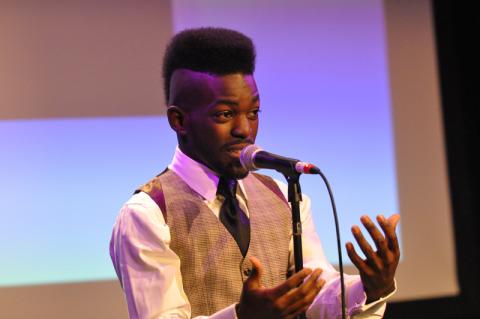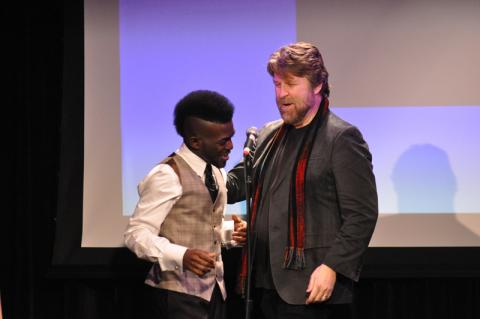Alumnus Will Wells Dishes Out Advice

Will Wells '11 talks about his career.
Photo by Phil Farnsworth

MP&E professor Stephen Webber introduces Will Wells. Webber served as a mentor to Wells and helped him land his first gig in L.A.
Photo by Phil Farnsworth
When Will Wells ‘11 was at Berklee, he made it his business to diversify his experience by seeking out opportunities and mentors not always tied to his major or focus of study (film scoring and music production and engineering). That mindset has paid off as he forges an impressive career in the music industry. In fact, it was MP&E professor Stephen Webber, with whom he worked on Re:Generation, and Peter Gordon, director of Berklee Center in L.A., who helped him land his first post-Berklee gig as house engineer for Woodshed Recording in Malibu, California, owned by film composer Richard Gibbs. He's since added to his resume music department assistant for Bring It On: The Musical (Alex Lacamoire '95 was the musical supervisor); string arranger/conductor for Wyclef Jean's "Historia;" and touring with the electropop duo LMFAO as SkyBlu's road manager and tour bus engineer—all proof that adaptability and versatility pays off. During a recent visit back to Berklee, he imparted lessons that have served as the underpinnings for his success to date.
The following is a condensed and edited version of the advice he shared with a group of students during a Life After Berklee clinic sponsored by Alumni Affairs.
On versatility
My versatility has been my saving grace. Use creative thinking and intelligence to make money. I would play for vocalists’ proficiencies. I started making CDs for people and advertising it. At the same time I was still songwriting, still engineering. Now is the time (to do this while you’re at Berklee), with the unlimited amount of resources. You might realize that you really are interested in something, that if you had looked at it right away you might not think you were interested in it. When I started working with LMFAO, I realized I have a passion for electronic music. Don’t focus on what you don’t want to be or the box you don’t want to be put in. Just direct all focus into what you do want to do, and how much you want to explore.
On utilizing the resources at Berklee
Now is the time for experimentation. It is the time to try things and make mistakes. Figure out what you do and don’t like.
You will never have the wealth of the musicians that are here to play your pieces and you won’t have studio access for free. But try it all and explore and maybe it will just click one day.
You are what you want people to think you are. If you want to be a producer, then you go out and say you are a producer. You’ll learn when it is appropriate to say different things. I have different resumes for different situations. It is important to have a targeted resume. People say, "Oh you can’t do it all," but you can try.
I took advantage of as many of the resources as I could. I was an aspiring arranger, and in MPE. I wanted to be in shows and in front of people. I played out a lot. My job really helped me. I worked in tech support for the Professional Writing Department. And in that job I found opportunity. Maybe you are MPE, maybe you are CWP. It doesn’t mean you can’t talk to more teachers. You are paying a lot of money to go to this school. Talk to everybody. Everybody. If I could change something while I was here, I would have talked to more people.
On focus
When you settle on the thing you want to do, the most important thing you can do is think about that goal every day. Look at it, put it on your computer screen or whatever. In (Earl Nightingale’s) The Strangest Secret (a gift from LMFAO’s SkyBlu) they say, be calm and cheerful. Think about it in a cheerful manner and be excited about it. It’s awesome to come to that goal.
On his work with SkyBlu (in addition to touring with LMFAO, Wells also served as front of house mixer and production manager for SkyBlu's group Big Bad University)
I had to show up to the show early, make sure that the rig was flown, everything on the technical side was done, and then actually mix the show. So when Sky wasn’t on stage, I was on. He wanted me to write songs, make beats. Me? I didn’t want to make beats. I thought, "I write songs, I don’t make beats." But shoot, I make beats now. Since then I have been freelancing, working with other producers.
On one of his seven daily life questions: Am I paying close attention to details?
Richard (Gibbs) had me write a lot of emails on his behalf. Something I used to do is write the email, send it, and then I realized the actual importance of reading over your email before you send it. I’m more aware of it now than I have been before. Every time I read over the email, I changed something.
On where he sees himself in five years
I’m 23 right now, so I’ll be 28. I’ll still be international. Hopefully I will have had some success. Getting songs on the radio, a hit would be nice. I’ve learned what a hit can do for the people who write them. Hopefully I will have enough resources that I can start making dents in academic environments and helping kids and helping people. It’s definitely one of my passions.
